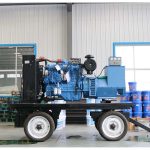Introduction
In the world of construction, power is a critical component that drives progress and success. Construction projects often take place in remote locations or in areas with limited access to the power grid, making it essential for construction teams to have reliable sources of electricity on site. Diesel generators play a crucial role in providing the necessary power for construction projects, ensuring that operations can continue smoothly and efficiently. In this article, we will explore the importance of diesel generators in construction projects, their benefits, key features, and best practices for using them effectively.
Benefits of Diesel Generators in Construction Projects
Diesel generators offer a wide range of benefits that make them an ideal choice for powering construction projects. Some of the key advantages include:
1. Reliable Power Supply: Diesel generators are known for their reliability and ability to provide consistent power, making them well-suited for construction sites where a continuous power supply is essential for running equipment and tools.
2. Portability: Diesel generators are typically compact and portable, allowing construction teams to easily move them around the site as needed. This flexibility makes them a convenient power source for construction projects of all sizes.
3. Durability: Diesel generators are built to withstand harsh conditions and heavy use, making them a durable and long-lasting power solution for construction sites that may be exposed to rough terrain and inclement weather.
4. Cost-Effective: While the initial cost of purchasing a diesel generator may be higher than other types of generators, their fuel efficiency and long lifespan make them a cost-effective choice in the long run. Diesel fuel is also generally more affordable and readily available compared to other fuel sources.
5. High Power Output: Diesel generators are capable of delivering high power output, making them suitable for running heavy-duty construction equipment and machinery that require a significant amount of electricity to operate.
Key Features of Diesel Generators for Construction Projects
Diesel generators come in various sizes and configurations to suit the specific power needs of construction projects. Some of the key features to consider when selecting a diesel generator for a construction site include:
1. Power Output: The power output of a diesel generator is measured in kilowatts (kW) or megawatts (MW) and should be matched to the power requirements of the construction equipment and tools that will be used on site.
2. Fuel Efficiency: Diesel generators are known for their fuel efficiency, with modern models incorporating advanced technologies to optimize fuel consumption and reduce operating costs.
3. 500kw diesel generator for remote energy projects : Diesel generators typically feature either air-cooled or water-cooled engines, with water-cooled engines offering better performance and durability for heavy-duty applications.
4. Noise Levels: Construction sites can be noisy environments, so it is important to consider the noise levels produced by a diesel generator to ensure compliance with local regulations and minimize disruptions to workers and surrounding communities.
5. Maintenance Requirements: Regular maintenance is essential to keep a diesel generator running smoothly and efficiently. Look for models that are easy to maintain and service, with accessible components and clear maintenance schedules.
Best Practices for Using Diesel Generators in Construction Projects
To maximize the benefits of diesel generators in construction projects, it is important to follow best practices for their operation and maintenance. Some key practices to consider include:
1. Proper Sizing: Ensure that the diesel generator selected for the construction site is appropriately sized to meet the power requirements of the equipment and tools being used. Oversized generators can lead to inefficiencies and unnecessary fuel consumption.
2. Regular Maintenance: Establish a routine maintenance schedule for the diesel generator to keep it in optimal condition. This includes checking and changing the oil, filters, and other components as recommended by the manufacturer.
3. Fuel Management: Monitor fuel levels regularly and ensure that an adequate supply of diesel fuel is available on site to avoid interruptions in power supply. Proper storage and handling of fuel are also important to prevent contamination and ensure safety.
4. Environmental Considerations: Diesel generators emit exhaust fumes that contain pollutants harmful to the environment and human health. Position the generator in a well-ventilated area away from workers and sensitive environments, and consider using emission control technologies to reduce emissions.

5. Safety Precautions: Diesel generators pose certain safety risks, including fire hazards and electrical dangers. Implement safety protocols for handling and operating the generator, provide training to workers on safe practices, and install appropriate safety devices such as circuit breakers and grounding systems.
Conclusion
Diesel generators are indispensable power sources for construction projects, providing the reliable and efficient electricity needed to drive progress and productivity on site. Their portability, durability, cost-effectiveness, and high power output make them a preferred choice for construction teams working in diverse environments and conditions. By selecting the right diesel generator, following best practices for operation and maintenance, and prioritizing safety and environmental considerations, construction projects can benefit from the dependable power supply that diesel generators offer.
